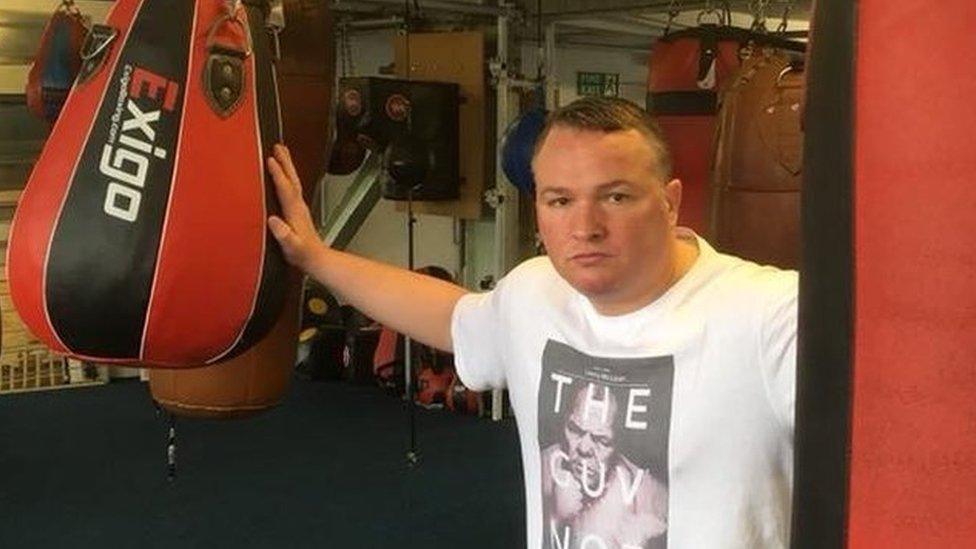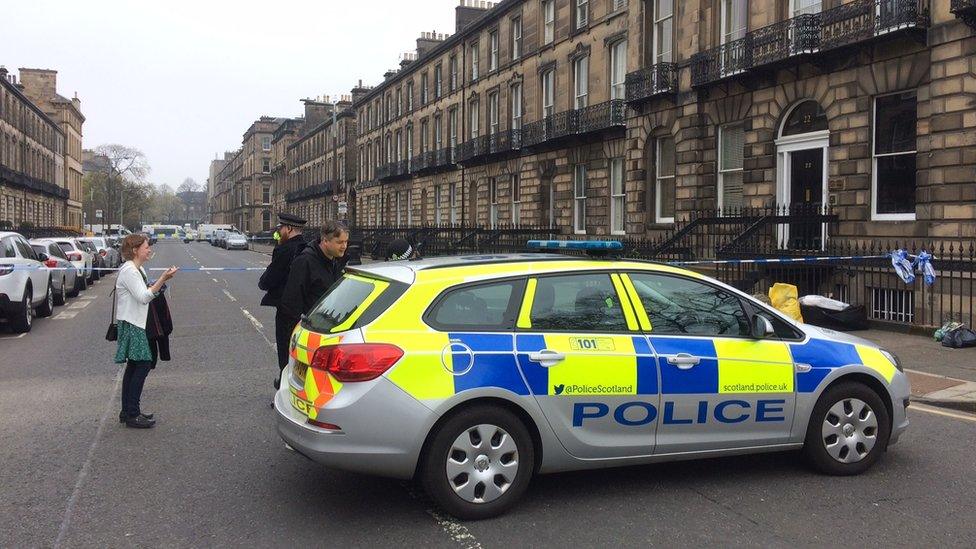Bradley Welsh murder: Police 'told' of murder plot against T2 Trainspotting actor
- Published

Bradley Welsh was shot outside his Edinburgh home two years ago
Police were warned of plans to murder a man who appeared in the Trainspotting sequel T2 in the month before his death, a court has heard.
Bradley Welsh, 48, was shot at close range outside his flat in the west end of Edinburgh on 17 April 2019.
Sean Orman, 30, has pleaded not guilty to all 15 charges against him, including murder, attempted murder, firearms and drugs offences,
Mr Welsh, who ran a boxing gym, was fatally wounded by a shotgun blast.
Witness Dean White, 49, told the trial he overheard Mr Orman speaking at his brother's house in Duddingston in March 2019, a few weeks before Mr Welsh was found dead.
He said Mr Orman was telling a man called Peem he was being paid £10,000 to kill Mr Welsh.
Wad of cash
Mr White told advocate depute Richard Goddard he told the police about the admission soon afterwards.
He said he had earlier seen Mr Orman with a "wad of cash" containing thousands of pounds.
He told the court they were speaking about an attack on a man and his son in the Oxgangs area which had been carried out for money.
He said the accused then claimed he was due to murder Mr Welsh for £10,000, which prompted the witness to alert Police Scotland.
Mr White said: "He brought a wad of cash out and it was like thousands and he had told us that he had seriously assaulted someone in Oxgangs and the guy that he'd assaulted got in the way and that he seriously assaulted his son as well."
The witness told the court Mr Orman claimed to have been paid by a man called Dode Baigrie to carry out the assault.
Mr White added: "He said his next hit he was getting £10,000 to kill Bradley Welsh.
"I went to the police and reported this before it happened."
Recovered bullet
The 49-year-old said he had seen Mr Orman at his brother's property on several subsequent occasions.
He said the accused had turned up there with an "old-styled" shotgun which he was showing off and misfired into the floor of the property.
Mr White said he later told officers about the incident and that they may be able to recover the ammunition.
Mr Goddard asked how he had felt about the events in his brother's property.

Bradley Welsh was shot outside his flat in Chester Street, Edinburgh
Mr White said: "Extremely nervous and I went straight to the police station and told them exactly what happened in my brother's house.
"I told them what their plans were, that they were going to get Bradley Welsh and this was a month before the guy got murdered."
Earlier in the day, Mr Goddard read the jury a statement of evidence which was agreed between prosecutors and defence lawyers.
'Death may not have been immediate'
In the statement, Mr Goddard said medics carried out a post mortem examination of Mr Welsh two days after he was found dead.
He said: "The most significant aspect of the shotgun wound was that it had cut the right external carotid artery. This is a major blood vessel on the head and neck. The mechanism of death was blood loss associated with this wound.
"Death may not have been immediate and the deceased my have been capable of some degree of physical activity until the degree of blood loss became critical.
"Pathological findings are that the shotgun was discharged at a distance of approximately one metre from the deceased."
The court has previously heard of alleged attacks on David McMillan, 50, and his son David, 25, at their home at Pitcairn Grove, Edinburgh, on 13 March.
Mr Orman is accused of attempted murder and assault in relation to this incident.
Other charges he faces include driving at speeds up to 123mph on the Edinburgh bypass on April 22 2019 - where the limit is 70mph - and failing to stop for uniformed police officers.
He faces an accusation of having driven on the opposing side of the carriageway of Clovenstone Road "in excess of 92mph", where the limit is 30mph.
Another charge alleges he drove without insurance and was in possession of the class A drug diamorphine and class C drug diazepam.
The trial, before judge Lord Beckett, continues.
Related topics
- Published21 April 2021
